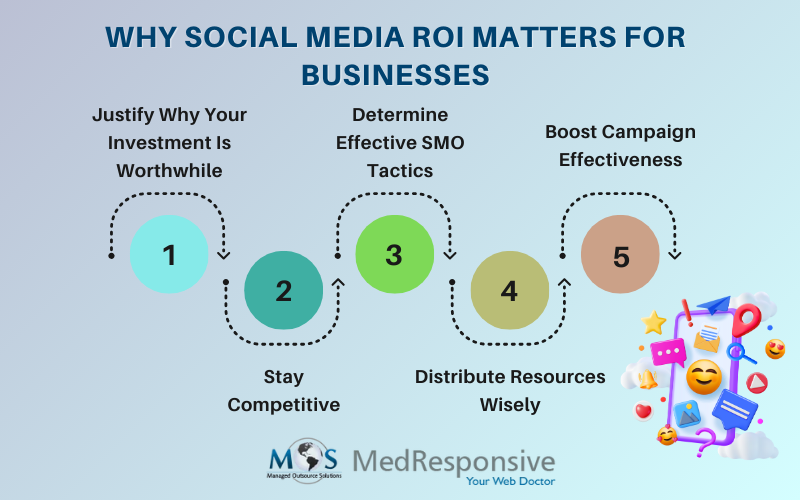Social media has drastically changed the way people interact and communicate with each other and it is an excellent platform for digital marketing for healthcare. The entire marketing landscape has changed with the introduction of social media. Today, many patients use social media avenues to find their physicians online and it has become crucial for physicians and medical practices to create an online presence and make a lasting impression among the patients. There are many social media tools available that can be used to reach your target audience. A reliable provider of healthcare digital marketing services researches, discovers, analyzes and implements relevant strategies and techniques to provide customized website and social media optimization that will bring excellent ROI.
Social media is a high impact marketing channel and hence measuring and tracking social media return on investment is crucial. However, measuring the impact of your social media efforts is not very easy. You cannot be sure about the revenue your YouTube video or Instagram post brought in. In fact, many businesses have only a vague idea about the financial impact their social media marketing has. The usual challenges businesses have in measuring their social media ROI include lack of expertise, resources and analytics; insufficient tools, unreliable data and inconsistent analytical approaches.
Social Media ROI – Its Importance
Social media ROI refers to the revenue earned from all your social media marketing efforts that is measured in terms of dollars. To measure this correctly, you should know how much money you are investing in social media, and how much money your social media objectives are worth. You need to track each step you are taking, what is being spent and what the results are. Social media ROI should be measured because it will help you identify the areas where you need to improve your efforts, the social media platforms that are bringing you maximum revenue, and how particular changes are affecting your social media goals. Take for instance, Google AdWords campaign. Shouldn’t you check the amount you are paying per click, the kind of click-through-rate you are getting, and how many people who clicked on your ads are actually converting?
The definition of social media ROI may vary according to your specific goals. These goals may be revenue, brand awareness, customer satisfaction and so on. In other words, you can say it is the overall results of all your social media efforts that create value.
- If your primary objective is revenue from your investment, the formula for calculation of social media ROI is:
- Profit/total investment (people, hours, ad budget etc) X100 = Social Media ROI (in percentage)
If your goal is creating brand awareness, you would be measuring your success not in terms of profit but in terms of audience engagement, and reach. For this you need to know what actions your audience took, whether they were in keeping with your goals, whether there were any shortcomings, and how they can be improved next time.
Social media ROI is important for businesses including medical businesses for the following reasons:
- Justify your investment: You may demonstrate to decision-makers and stakeholders the benefits of spending money on social media marketing by assessing social media ROI. Securing ongoing support and funding allocation for upcoming campaigns will be made easier by showcasing tangible achievements and establishing their influence on corporate objectives.
- Stay competitive: It is imperative to maintain an edge over your rivals in the current digital environment. Measuring social media return on investment (ROI) enables you to monitor your performance in relation to industry norms and your competitors’ performance. This helps you remain relevant in a fast-paced setting and make well-informed decisions.
- Determine effective tactics: Knowing which techniques work best helps you to reproduce successful approaches on various platforms or campaigns. You can find trends in the data gathered from social media ROI measurement, learn more about the preferences of your audience, and adjust your content as necessary.
- Distribute your resources wisely: By tracking social media return on investment, you can find underperforming initiatives or platforms that don’t offer enough value for your money. You may maximize your return on investment and make the most of your marketing budget by shifting resources to channels or initiatives that are doing better.
- Boost the effectiveness of your campaign: Monitoring the return on investment of social media marketing enables you to pinpoint areas in need of development. You may improve engagement and conversion rates by fine-tuning your messaging, targeting, and content strategy by learning what appeals to your audience.
How to Measure Social Media ROI
- Establish specific goals: Establishing specific goals that are in line with your company’s objectives is crucial before you start tracking social media return on investment. Are you trying to raise sales, create leads, enhance website traffic, or raise brand awareness? Having a clear understanding of your goals can help you choose which metrics to monitor and establish success criteria.
- Monitor the appropriate metrics: It is essential to monitor the appropriate indicators in line with your set objectives in order to calculate social media ROI with accuracy. Reach, engagement rate, clicks, conversions (leads or sales), cost per click (CPC), customer acquisition cost (CAC), and return on ad spend (ROAS) are some important metrics to take into account. You can determine the success of your social media activities by monitoring these data over an extended period of time.
- Determine the price of your paid and organic social media campaigns: In order to compute ROI precisely, you must be aware of the expenses related to your social media presence. This covers sponsored tactics like advertising campaigns in addition to organic ones like community management and content production. You can obtain a more thorough understanding of your investment returns by including these expenses in your ROI calculation.
- Make a report on ROI: It’s time to put together a ROI report after you have computed the expenses and monitored the necessary KPIs. An overview of your goals, the metrics you monitored, the formula you used to calculate ROI, and the actual ROI findings should all be included in this report. A well-organized report will give you a comprehensive picture of your social media performance and help you make wise decisions. These techniques will help you measure social media ROI successfully and get insightful information about how your social media initiatives are affecting your company objectives.
Some Social Media ROI Tools
Here are some tools that will help you track consumer actions, set up conversion funnels, analyse data and report the results.
- Google Analytics: Track website traffic, onsite conversions and sign ups emerging from social media campaigns
- Facebook Pixels: Allows to track conversion from Facebook ads, everything from leads to sales.
- UTM parameters: These short text codes can be added to a URL to track data regarding traffic sources and website visitors. They work with Google Analytics and other analytics programs and give a comprehensive picture of your social media performance. You can get information regarding the networks that are performing best, as well as the particular content or post that brought the maximum traffic to a particular page.
How to Improve Social Media ROI
- Recognize your target audience: You need to know your target audience if you want to maximize your social media performance. To obtain a comprehensive understanding of customers’ preferences, interests, and pain areas, do market research, evaluate customer data, and utilize social listening technologies. You can increase engagement rates and encourage conversions by customizing your messaging and content to speak to your target demographic.
- Concentrate on quality content: Providing your audience with valuable material of the highest caliber is crucial to increase engagement and conversion rates. Make an investment in producing educational blog posts, films, infographics, and other content kinds that cater to the demands of your audience. By providing your audience with valuable material, you can gain their trust and position yourself as a thought leader in the field.
- Test the Frequency of Postings: Determining the ideal posting frequency on various social media networks might have a major effect on engagement rates. Try a variety of posting schedules to find out when your audience is most responsive and active. Examine each platform’s analytics on a regular basis to spot trends or patterns in the engagement levels depending on how frequently you post.
- Examine Data and Repeat: Examine the information gathered from monitoring social media analytics on a regular basis to get insightful knowledge about the preferences and behavior of your audience. Make use of this knowledge to experiment with new ideas, improve upon effective tactics, and hone your strategy through iteration. You may increase return on investment by testing and adjusting your social media approach on a regular basis according to the findings of data.
- Monitor Your Rivals: Keeping an eye on your rivals’ social media activity can give you important insights into their tactics and point out areas where you can improve. Examine their performance overall, engagement rates, and content to provide a comparative perspective of the market. You can find areas where you can set yourself apart from the competition and obtain a competitive edge by benchmarking against them.
- Make use of social lead generation: Conversion-boosting lead-generation tools and features are available on social media sites. Make smart use of call-to-action buttons, landing page links, and lead generation forms on various platforms. You may increase conversion rates and shorten the client experience by directly obtaining leads from social media. Call-to-action buttons are effective tools for increasing conversions on social networking sites, in addition to lead generation forms. Businesses can steer users toward particular activities that support their marketing goals by carefully putting these buttons within social media posts or adverts. These might be downloading content, subscribing to newsletters, or making a transaction. These call-to-action buttons’ use of strong wording can encourage users to take action by boosting engagement.
- Utilize the tools: Make the most of social media management tools to improve efficiency, automate tedious work, and obtain more insightful data. Tools with comprehensive scheduling options, content curation features, dashboards for data visualization, and more are available, such as Sprout Social, Hootsuite, and Buffer. You can increase your overall social media ROI and save time by making efficient use of these tools. Through the implementation of these methods and ongoing refinement of your approach based on insights gleaned from data, you can increase your return on investment (ROI) from social media and achieve better business outcomes.
Social media users, especially those looking for healthcare services are growing increasingly and hence it is important for healthcare providers to have a strong online presence to attract more prospective patients. A reliable provider of healthcare SEO services can provide the necessary support to optimize your medical website as well as provide social media optimization, and measure social media ROI.




